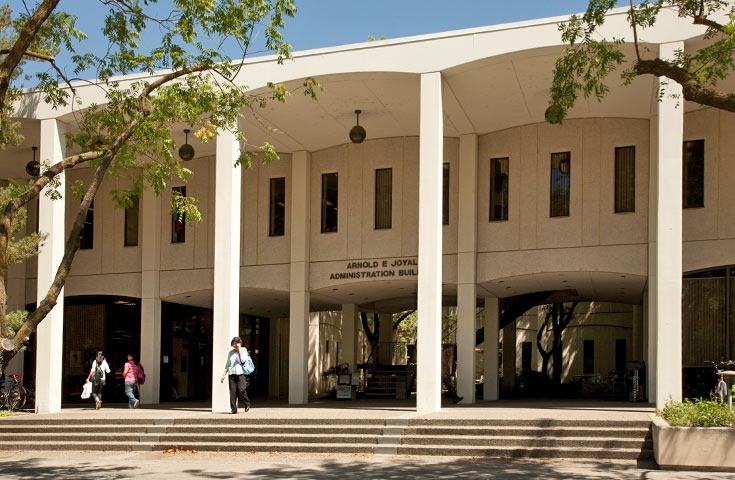Office of the University Registrar
Family Educational Rights and Privacy Act of 1974
The Family Educational Rights and Privacy Act of 1974, as amended (also sometimes referred to as the Buckley Amendment), is a federal law regarding the privacy of student records and the obligations of the institution, primarily in the areas of release of records and the access provided to these records. Any educational institution that receives funds under any program administered by the U.S. Secretary of Education is bound by FERPA requirements. Institutions that fail to comply with FERPA may have funds administered by the Secretary of Education withheld.
Under FERPA, education records are defined as records that are directly related to a student and are maintained by an education agency or institution or by a party acting for the agency or institution. Education records can exist in any medium, including: typed, computer generated, videotape, audiotape, film, microfilm, microfiche and email, among others.
Education records DO NOT INCLUDE such things as:
- Sole possession records such as records or notes in sole possession of the maker, used only as a personal memory aid and not revealed or accessible to any other person except a temporary substitute for the maker of the record. (This might include notes an instructor makes while providing career or professional guidance to a student.)
- Medical treatment records that include but are not limited to records maintained by physicians, psychiatrists and psychologists.
- Employment records when employment is not contingent on being a student, provided the record is used only in relation to the individual's employment.
- Records created and maintained by a law enforcement unit used only for that purpose and revealed only to law enforcement agencies of the same jurisdiction, as long as the enforcement unit does not have access to education records.
- Post-attendance records such as information about a person obtained when the person was no longer a student (e.g., alumni records) and does not relate to the person as a student.
According to FERPA, personally identifiable information in an education record may not be released without prior written consent from the student. Some examples of information that MAY NOT BE RELEASED without prior written consent of the student are:
- Birth date
- Religious affiliation
- Citizenship
- Disciplinary status
- Ethnicity
- Gender
- Grade point average (GPA)
- Marital status
- SSN and student I.D. number
- Grades and exam scores
- Test scores (such as SAT, GRE, etc.)
- Progress reports such as STARS
The university will not release personally identifiable information from a student's education record without the student's prior written consent. Even parents are not permitted access to their son’s or daughter's education records unless the student has provided written authorization permitting the parents' access. Exceptions are noted in the university's policy concerning the privacy of student education records and include: access by "school officials" the institution has determined to have a "legitimate educational interest;" access by school officials at other schools where the student seeks to enroll; access for the purpose of awarding financial aid; and subpoenas.
FERPA has specifically identified certain information called directory information that may be disclosed without student consent. Although directory information may be disclosed without student consent, Fresno State is not required to release directory information.
Fresno State has designated the following information as directory information and may release this information, unless the student has submitted a request for non-disclosure:
- Name
- Major field of study
- Student photo
- Participation in officially recognized University sports and activities
- Weight and height of members of athletic teams
- Enrollment status (undergraduate or graduate, full-time or part-time)
- Transcripted degrees, awards and honors (including dates) received at California State University, Fresno
- The most recent educational institution attended
Students and former students have rights to inspect and review their education records within 45 days from making such a request. The right of inspection and review includes: the right to access, with an explanation and interpretation of the record; the right to a copy of the education record when failure to provide a copy of the record would effectively prevent the student from inspecting and reviewing the record. The institution may refuse to provide a copy of a student's education record provided such refusal does not limit access.
Limitations exist on students' rights to inspect and review their education records. For example, the institution is not required to permit students to inspect and review the following:
- financial information submitted by parents;
- education records containing information about more than one student (however, the institution must permit access to that
- part of the records which pertains only to the inquiring student);
- confidential letters and recommendations placed in the student's file before 01/01/75;
- confidential letters and statements of recommendation, placed in the records after 01/01/75, to which the student has waived his or her right to review and that are related to the student's admission, application for employment or job placement, or receipt of honors.
Students may request that their education records be amended if they believe such information is inaccurate, misleading, or in violation of privacy rights. Students must request in writing that the office that maintains those records amend them. Students should identify the part of the records they want corrected and specify why they believe it is inaccurate, misleading, or in violation of privacy rights.
A student should submit a written request to the University Registrar, Joyal Administration Building, Room 106, that identifies the record(s) the student wishes to inspect.
According to FERPA, a student can request that the institution not release any directory information about him or her. Institutions must comply with this request once it is received, if the student is still enrolled.
At Fresno State, students who wish to restrict the release of directory information about themselves must complete a "Request To Restrict Directory Information" form. Contact University Registrar at fsregistrar@mail.fresnostate.edu to request the form.
Students who wish to restrict directory information should realize that their names will not appear in the commencement program and other university publications. Also, employers, credit card companies, loan agencies, scholarship committees and the like will be denied any of the student's directory information and will be informed that we have no information available about the student's attendance at Fresno State.
Consistent with its obligations under FERPA, Fresno State annually notifies students of the rights accorded them by FERPA.
Fresno State students are notified of their FERPA rights by email and in the General Catalog. A copy of the document, with specific student rights, can be found here.
Solomon Amendment is a federal law that allows military recruiters to access some address, biographical and academic program information on students age 17 and older.
The Department of Education has determined the Solomon Amendment supersedes most elements of FERPA. An institution is therefore obligated to release data included in the list of “student recruiting information,” which may or may not match Fresno State’s FERPA directory information list.
However, if the student has submitted a FERPA Request to Withhold Directory Information form to the Registrar's Office, to restrict the release of their directory information, then no information from the student's education record will be released under the Solomon Amendment.
"Student Recruitment Information" or "Solomon Information" as defined by the Solomon Amendment:
- Name
- Address*
- Telephone*
- Email*
- Age and date of birth*
- Place of birth*
- Level of education
- Academic major
- Degrees received
- Educational institution in which the student was most recently enrolled
*is not defined as Directory information at Fresno State.
Procedure for releasing information to military recruiter:
- Under the Solomon amendment, information will be released for military recruitment purposes only.
- The military recruiters may request student recruitment information once each semester
within the five branches of the service:Army:
- Army, Army Reserve, Army National Guard
- Navy: Navy, Navy Reserve
- Marine Corps: Marine Corps, Marine Corps Reserve
- Air Force: Air Force, Air Force Reserve, Air Force National Guard
- Coast Guard: Coast Guard, Coast Guard Reserve
- The request should be submitted in writing on letterhead clearly identifying the unit of service requesting the student recruitment information.
- The request should list what student recruitment information is being requested.
- The request should specify whether the information needed is for the current or previous semester.
All responses to Solomon Amendment requests for information will be reviewed by the Registrar's office. Requesters can expect a response in 7-10 business days. Military Recruiters are to submit their Solomon requests to: registrar@csufresno.edu.





